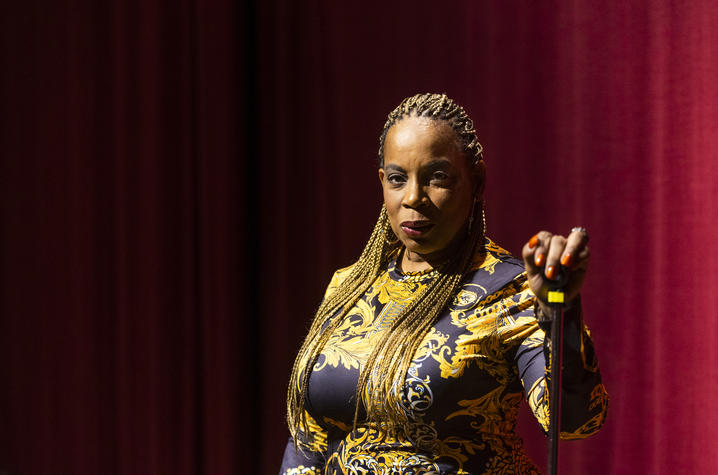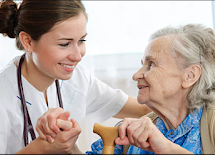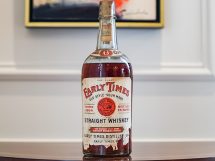
LEXINGTON, Ky. — As a stand-up comedian, Debra Faulk is an expert at transforming life’s most difficult and uncomfortable moments into something that lifts others.
Active in the local comedy scene, the 54-year-old Lexington native uses standup as a platform to shine a light on serious health issues, with much of her routine inspired by her family’s experiences: one sister dealt with intellectual disabilities while another had breast cancer, her brother served in Desert Storm and came back with PTSD, her father had dementia, and her mother was on dialysis.
“This is all under one roof,” she said.
With her comedic talent, Faulk’s family experience has given her the unique ability to connect with others on topics that can be difficult to talk about.
“Throughout my life, I’ve used my experiences as a caretaker, a family member, and a friend of people with health conditions to encourage, inspire and inform others through laughter,” Faulk said.
After her breast cancer diagnosis in 2021, Faulk is now using the stage to spread awareness through the perspective of a cancer survivor.
Faulk spent many years in Los Angeles as a professional stand-up comedian and actor before moving back to Kentucky to continue her theatrical work. In addition to stand-up comedy, she currently serves as one of Lexington’s Civic Artists in Residence and works with Kentucky Humanities portraying Nancy Green, the Kentucky activist, philanthropist and missionary whose likeness became known as “Aunt Jemima.”
Faulk has strong ties to the University of Kentucky: in 2007, she earned a bachelor’s degree in theatre and has served as a guest lecturer and adjunct professor in the College of Fine Arts’ Department of Theatre and Dance.
Faulk’s UK connections now include getting her care at UK HealthCare. In 2021, her annual screening mammogram detected a small mass in her right breast. After a follow-up ultrasound and biopsy at UK Markey Cancer Center, she got the news that it was stage 1 breast cancer.
Faulk says the diagnosis was especially difficult given her family experience with breast cancer. Her grandmother, aunt and sister all had the disease. Her sister passed away at only 33 years old.
At UK Markey Cancer Center, Faulk met with surgical oncologist Emily Marcinkowski, M.D., who would operate on her and guide her through treatment. Marcinkowski explained that her form of cancer was highly treatable.
Faulk had triple-positive breast cancer, driven by the hormones progesterone, estrogen, and the HER2 protein.
That month, Faulk underwent a lumpectomy to remove the cancerous tissue from her breast.
After the procedure, she was considered cancer free but would need to have chemotherapy and radiation therapy to reduce the risk of recurrence. Faulk’s treatment care team at Markey included medical oncologist Mara Chambers, M.D., and radiation oncologist Mark Bernard, M.D.
Faulk’s chemotherapy treatments began in April. She received a combination of Taxol and Herceptin, medications that reduce the recurrence of early-stage breast cancer. After chemotherapy, she underwent a month of daily radiation therapy treatments, which ended in October.
Faulk took a break from the Herceptin, and Arbune started her on cardioprotective medications that improved her heart function. This allowed her to get back on chemotherapy and complete her full course of treatment without further heart complications.
Faulk had more positive news during her course of treatment. Genetic testing showed that she did not have BRCA gene mutations, raising the risk of cancer. The results also meant that her cancer was not hereditary, even though three close relatives had breast cancer.
“I’ve been trying to make sense of it all. Maybe it was to make my comedy better; maybe it was to help make me more believable. Maybe it was to help me be more compassionate,” Faulk said. “I think it comes down to that I had to fight a real fight so I could understand people on a different level. And now I get to live to tell the story.”
Faulk now plans to use her story to spread awareness about the importance of annual mammograms, particularly among Black women, who are 40% more likely to die from breast cancer than white women, even though the incidence rate is about the same. This likely reflects the fact that fewer cancers are diagnosed at an early stage, due to factors including less access to and higher levels of mistrust toward health care.
She also plans to offer support to other patients and survivors through comedy.
“Patients need to know they are their best advocates,” Faulk said. “They need to make certain their voices are heard. At the same time, it’s ok to ask for help. Take advantage of all the services available to you.”
Ultimately, she hopes that sharing her experiences can help others in a similar place find the light in dark situations.
Click here for more Kentucky business news.



















